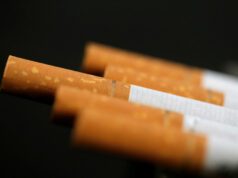REPRESENTATIVE Jose Ma. Clemente S. Salceda, the Ways and Means committee chair from Albay’s second district, rejected the Senate’s proposal to impose a 20% excise tax on e-cigarette devices, saying that he prefers to tax consumption.
“You tax the consumption… Kung di nabibili ‘yung device, minahalan mo ‘yung device, makikihiram… baka maka transfer ka pa ng sakit (If the device is taxed, it will become more expensive, and might encourage the borrowing of devices, which might be a risk for disease transfer)” Mr. Salceda said in a chance interview at the Palace last week.
Senator Emmanuel D. Pacquiao’s Senate Bill No. 987 will increase rates to P45 per pack of heated tobacco products and per milliliter of vapor products beginning in 2020. This is to increase by P5 per year until it reaches P60 in 2023; and by 5% every year thereafter.
The proposal will also impose a 20% excise tax on e-cigarette devices based on the wholesale price or the value of importation.
Finance Undersecretary Karl Kendrick T. Chua has said the Senate’s version of the e-cigarette tax could generate P3.2 billion in the first year of implementation, much higher than the equivalent House bill’s projection of P1.2 billion.
House Bill 1026, which also provides for higher taxes on alcoholic beverages, received third and final reading approval in that chamber on Aug. 20.
Revenue from the measure will help fill the P62-billion funding gap for Republic Act No. 11223, or the Universal Health Care (UHC) Act, due to roll out in 2020.
The tax law, which will become RA No. 11346 if passed, will gradually increase excise tax on tobacco products to P60 per pack by 2023 from P35 currently. The same law introduced the following rates on vapor products: P10 on 10 milliliter vapor products, P20 on 20 ml, P30 on 30 ml, P40 on 40 ml, P50 on 50 ml and so on.
The Philippine e-cigarette Industry Association (PECIA) and the Vapers Philippines (Vapers PH) said in August that taxing e-cigarette and vapor products on par with regular cigarettes will not curb tobacco use and will discourage use of their “less harmful alternatives” if they were taxed at the same rate.
They urged legislators to consider studies which found that e-cigarettes and vapor products are a “significantly less harmful alternative.”
“Heavy taxes on reduced-risk products will only result in smokers sticking it out with conventional cigarettes instead of switching to less harmful nicotine products,” Vapors PH said.
PECIA also pushed for a public consultation on proposed tax legislation which they said will be a venue to discuss other measures to reduce tobacco use. — Arjay L. Balinbin



